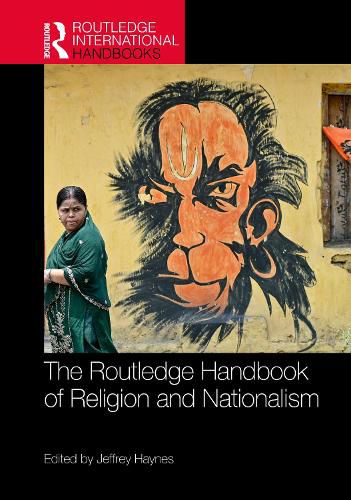Readings Newsletter
Become a Readings Member to make your shopping experience even easier.
Sign in or sign up for free!
You’re not far away from qualifying for FREE standard shipping within Australia
You’ve qualified for FREE standard shipping within Australia
The cart is loading…






The Routledge Handbook of Religion and Nationalism comprehensively surveys the sub-disciplinary area of religious nationalism, an interaction between religion and nationalism. The handbook has a global focus, including sections on how, why and with what effects religion and nationalism impact politically both domestically and internationally, as well as discussing the future of the field and religious nationalism 'on the ground'. Bringing together a range of expert contributors the handbook is split into two main parts: core issues and country case studies. Religions studied include Islam, Christianity, Hinduism, Judaism, and Buddhism, across countries in Asia, Europe, the Middle East and North Africa, Sub-Saharan Africa, North America, and South America. The core issues examined cover: nationhood as a concept; historical perspectives on nationalism; theoretical approaches to nationalism; the state; populism; violence and conflict; immigration; terrorism; globalisation; the post-secular world; and foreign policy. Given the comprehensive nature of the handbook, it provides crucial, complementary reading for students, scholars and professionals across politics, religion, and policy making.
$9.00 standard shipping within Australia
FREE standard shipping within Australia for orders over $100.00
Express & International shipping calculated at checkout
The Routledge Handbook of Religion and Nationalism comprehensively surveys the sub-disciplinary area of religious nationalism, an interaction between religion and nationalism. The handbook has a global focus, including sections on how, why and with what effects religion and nationalism impact politically both domestically and internationally, as well as discussing the future of the field and religious nationalism 'on the ground'. Bringing together a range of expert contributors the handbook is split into two main parts: core issues and country case studies. Religions studied include Islam, Christianity, Hinduism, Judaism, and Buddhism, across countries in Asia, Europe, the Middle East and North Africa, Sub-Saharan Africa, North America, and South America. The core issues examined cover: nationhood as a concept; historical perspectives on nationalism; theoretical approaches to nationalism; the state; populism; violence and conflict; immigration; terrorism; globalisation; the post-secular world; and foreign policy. Given the comprehensive nature of the handbook, it provides crucial, complementary reading for students, scholars and professionals across politics, religion, and policy making.